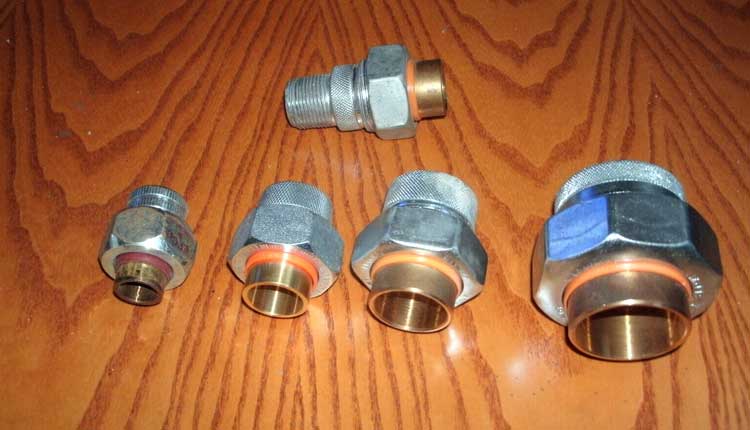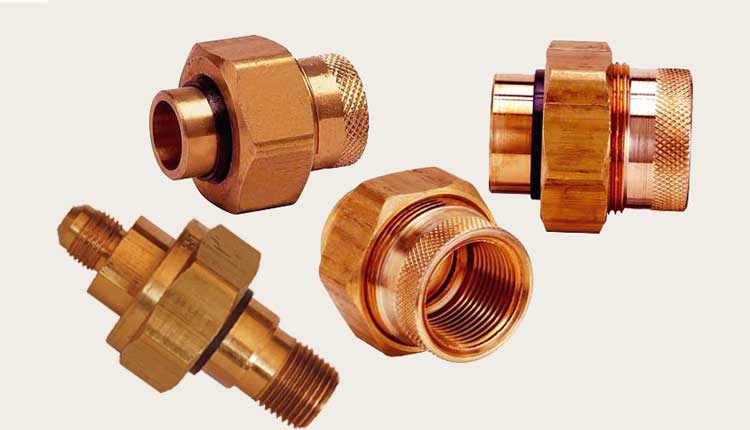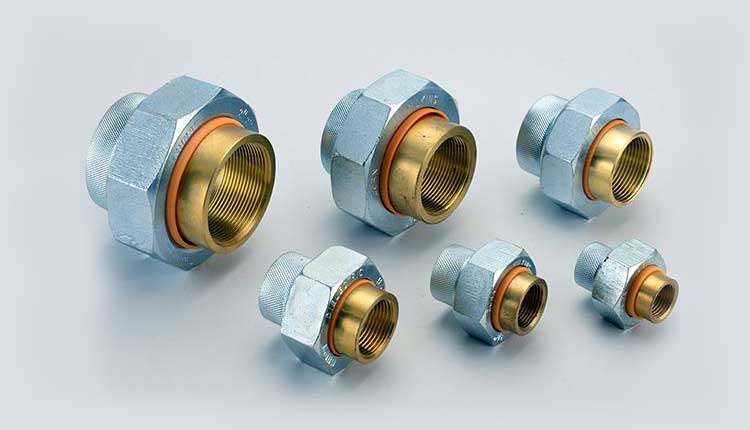- Home
- Products
- Other Fittings
- Dielectric Union
Dielectric Union
Dielectric Union Suppliers, Dielectric Pipe Unions, SS Dielectric Union, 3/4 Inches Dielectric Union, Dielectric Union Exporters, Threaded Dielectric Union, Dielectric Union Manufacturer in Mumbai, India.
Virgin Engineers is a trusted dielectric union manufacturer, supplier, and stockist in Mumbai, India. Both commercial and residential settings use dielectric unions to prevent galvanic and stray currents from accelerating pipe corrosion and degradation. They are inserted between two pipes composed of different metals. Dielectric unions are available in various designs, sizes, and materials.
Manufacturer of Dielectric Union, Dielectric Union Price List In India, Carbon Steel Dielectric Union, Brass Dielectric Union, Dielectric Union - MIP x Solder Stockist In Mumbai.
LF4001E Series Dielectric Unions, LF301 Series Dielectric Unions, Dielectric Union 3/4 x 1/2 Inch Fip x Solder, Dielectric Union Insulator Kit, Dielectric Union Traders, Dielectric Union Manufacturers in india.
A dielectric union is a special adapter or fitting used in various metal pipe systems to isolate the connections of dissimilar metals. An elastomeric rubber gasket seals the connection, and a plastic composite material separates the copper tube connection from the dielectric union's hex nut. When different metals interact by touching each other, they begin to corrode. The little amount of acid in water initiates the electrolytic reaction between the two metals, causing electrons to flow from one metal to the other. This reaction eventually leads to galvanic corrosion. A dielectric union connects the two dissimilar metal pipes to prevent galvanic corrosion.
At Virgin Engineers, we manufacture and supply dielectric unions designed to prevent corrosion caused by electrolysis in plumbing and piping systems. When two different metals, like copper and steel, touch, these special dielectric pipe fittings create an insulating barrier. This makes sure that the pipes last a long time and work well in industrial, HVAC, and water distribution systems.
Our dielectric fittings are made from premium materials and have a non-conductive insulator between a copper or brass body and a steel or stainless steel counterpart. By successfully preventing galvanic corrosion, this design prolongs the lifespan of pipe systems and lowers maintenance expenses. Gas pipelines, fire safety systems, and potable water lines frequently use these fittings to protect mixed-metal connections from electrolysis.
We offer copper dielectric unions in a range of sizes from ½” to 2” with pressure ratings up to 300 PSI. These fittings come in threaded (NPT), sweat, and compression connections, making installation simple and adaptable to different system requirements. They are designed to handle both hot and cold water applications, providing superior performance in residential, commercial, and industrial setups.
As they adhere to industry standards such as ASTM B62, ASTM A53, ASME B16.39, and ANSI/NSF 61, our dielectric pipe fittings are dependable and safe in high-stress scenarios. Strict quality checks are performed on every unit, including material verification and pressure testing, to ensure longevity and leak-free performance. Our goal at Virgin Engineers is to satisfy industrial expectations by offering dielectric unions with superior performance. Our precision engineering, premium materials, and dedication to client satisfaction enable us to provide tailored solutions for a range of pipe applications. For the greatest dielectric fittings suited to your project's requirements, contact us right now!
Specification
Materials
Stainless Steel, Carbon Steel, Copper, Brass
Pressure & Temperature
Max. Working Pressure: 250 psi (17.2 bar)
• Max. Working Temperature: 180ºF (82ºC)

Size
1/2"-2"(15-50MM)
Connection Type
Female Steel BSPT x Female Brass BSPT
Dielectric Union Materials
NO. |
PART |
MATERIAL |
1 |
FPT Connection |
Forged Steel (Electro Plated) |
2 |
Nut |
Forged Steel (Electro Plated) |
3 |
FPT Connection |
Brass /Copper |
4 |
Gasket |
EPDM |
5 |
Insert |
ABS |
Dielectric Union Dimensions
SIZE |
A |
B |
C |
D |
E |
1/2" |
1.84 |
0.83 |
0.77 |
2.79 |
1.01 |
3/4" |
2.16 |
1.04 |
0.79 |
2.85 |
1.27 |
1" |
2.60 |
1.31 |
0.88 |
3.42 |
1.52 |
1¼" |
2.93 |
1.65 |
0.84 |
3.68 |
1.82 |
1½" |
3.72 |
1.88 |
0.86 |
3.80 |
2.13 |
2" |
4.44 |
2.33 |
1.11 |
4.22 |
2.59 |
Other Type of Dielectric Union
| Stainless Steel Dielectric Union | Dielectric Series Class 3000 Unions |
| Dielectric Series Class 6000 Unions | Copper Alloy Dielectric Union |
| Dielectric Union Pipe | Dielectric Union Material |
| Threaded Dielectric Union | Brass Alloy Dielectric Union |
| Dielectric Union Price List | Dielectric Insulated Unions |
| Dielectric Unions Manufacturers and Suppliers | Dielectric Union Pipe Pressure Fitting |
| Copper Dielectric Union x Female Thread | Dielectric Union Water Heater |
FAQS
What Is A Dielectric Union?
A-To prevent galvanic corrosion, two-part fittings of different metals that are electrically insulated from one another are referred to as dielectric unions. The phrase is frequently used to refer to a group of plumbing pipe fittings. Two distinct metals exposed to an acidic solution can experience galvanic corrosion. A current of electricity flows between the two metals as a result of this mixture, which functions as a battery.
When To Use Dielectric Union ?
A-In an electrolytic reaction, water serves as the electrolyte and occurs when two dissimilar metals come into contact. Corrosion then starts to occur in the metals. Galvanic corrosion is what this is. The pipes made of various metals are joined together using dielectric unions to avoid this happening. When there is poor water quality and galvanized materials have a high probability of corroding, brass is frequently utilized for fittings for copper pipes. Brass is sensitive to acidic water despite being rust-resistant.
How To Install Dielectric Union ?
A-Cover the threads of the steel pipe with many layers of pipe sealing tape. The steel pipe should be connected to the threaded end of the dielectric union body. A pipe wrench should be used to tighten the union as you turn it clockwise.
With the open threaded end facing out, slid the union nut over the end of the copper pipe. Additionally, the copper pipe must be covered by the orange plastic insulator as illustrated.
Install the copper solder adapter onto the copper pipe, then melt the copper solder adapter to the copper pipe with a propane flame. Try to keep the plastic insulator as far away from the torch as possible to prevent the melting the insulator.
Union nut and union body are put together by sliding the rubber gasket between them. You should clockwise-twist the union nut with a pipe wrench.
Lastly watertight connection should be checked.
© Copyright | Virgin Engineers 2021. All Right Reserved.


